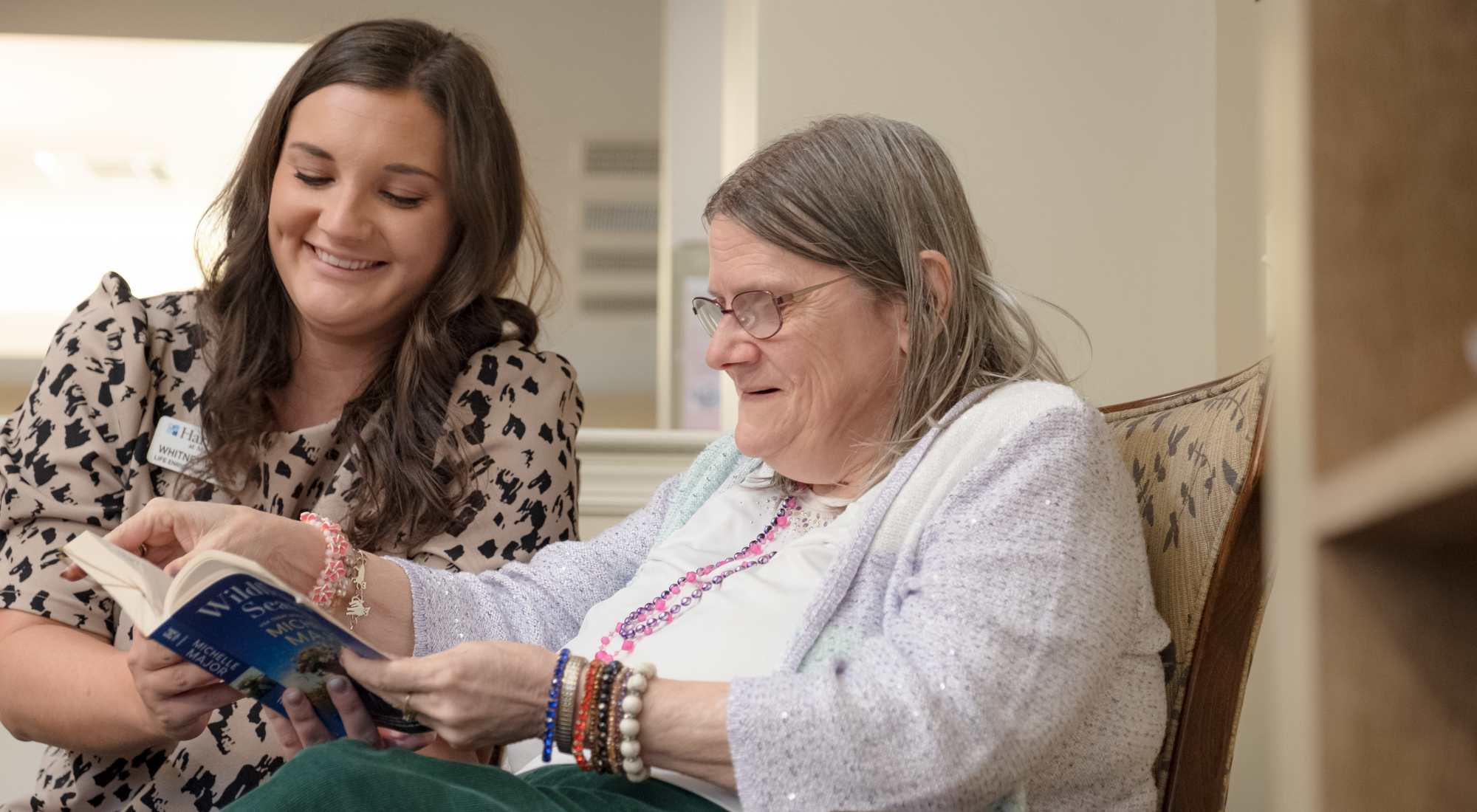Discover Boutique Memory Care with a Personal Touch Near You
Wiki Article
All About Memory Treatment Solutions: Why Tiny Memory Treatment Residences Are a Wonderful Choice
Memory care services play a necessary duty in supporting people with Alzheimer's and mental deterioration. Small memory treatment homes attract attention for their tailored method and intimate setting. With lower staff-to-resident proportions, these homes cultivate more powerful links and tailored treatment. Homeowners take advantage of improved social interactions and a safe environment. As families discover choices, understanding the one-of-a-kind advantages of little memory care homes becomes vital. What elements should be thought about when selecting the right home?Understanding Memory Treatment Services
While lots of may be familiar with general elderly care options, comprehending memory treatment solutions is important for family members dealing with the obstacles of cognitive decrease. Memory care specifically accommodates individuals with problems such as Alzheimer's condition and various other types of dementia. These services provide an organized setting that concentrates on enhancing the lifestyle for residents with specialized care and support.Memory treatment centers are created to ensure security and security, typically including secured settings to avoid roaming. Trained team member are readily available all the time to assist with day-to-day activities, medication administration, and individual treatment. In addition, memory care programs frequently include cognitive stimulation activities, customized to involve homeowners and promote psychological health. Families can take advantage of recognizing these solutions, as they allow notified decisions regarding their liked ones' treatment, making certain that their certain needs and choices are attended to in a helpful and caring manner.The Advantages of Little Memory Care Homes
Little memory care homes use distinctive benefits that can greatly boost the high quality of life for citizens with cognitive problems. One significant benefit is the intimate environment, which permits customized communications amongst staff and citizens. This smaller setting promotes significant connections, reducing sensations of isolation and anxiousness typically experienced by individuals with memory issues.Additionally, the reduced staff-to-resident proportion in little memory care homes allows caretakers to provide even more conscientious supervision and assistance. This technique not only boosts security but likewise promotes a sense of safety for the residents.Moreover, small memory treatment homes can adapt promptly to the distinct requirements and preferences of each local, enabling for an extra homelike environment. Such an atmosphere can encourage social engagement and involvement in tasks, inevitably enhancing the day-to-day experiences of those living with cognitive impairments.Personalized Care Plans for Citizens
Customized treatment plans are essential in memory care homes, as they accommodate the one-of-a-kind requirements and preferences of each homeowner. These plans start with comprehensive evaluations carried out by experienced experts, that review cognitive capacities, case history, and personal rate of interests. This tailored method assurances that care is not just effective however likewise respectful of each individual's dignity and autonomy.Moreover, individualized care strategies are flexible, permitting modifications as residents' demands develop with time. This versatility cultivates a complacency and knowledge, which is crucial for people dealing with memory challenges. Caregivers are educated to apply these plans regularly, providing support that aligns with the citizens' regimens and preferences.Ultimately, personalized treatment strategies enhance the lifestyle for homeowners by promoting well-being, interaction, and independence, making them a fundamental facet of memory treatment solutions in little memory care homes.Creating a Home-Like Atmosphere
Creating a home-like atmosphere is critical for fostering comfort and familiarity in memory treatment settings, as it considerably influences locals' psychological wellness. Little memory treatment homes frequently focus on tailored touches, such as cozy shade combinations, household pictures, and acquainted furnishings setups, which aid homeowners really feel much more secure. Integrating aspects similar to a traditional home, like comfortable space and communal locations, encourages a feeling of belonging.Moreover, utilizing natural light and outside areas can improve the ambience, advertising relaxation and peace. Team member play a significant role in keeping this atmosphere by involving with residents in a thoughtful way, treating them like household. Regular tasks, such as food preparation or gardening, can also add to a home-like feel, using chances for homeowners to join significant experiences. Generally, producing a nurturing environment sustains cognitive function and emotional security, making it an important aspect of memory care services.
Enhanced Social Interaction and Neighborhood
Improved social communication and community are important parts of memory care services. By fostering personalized social involvement and creating a family-like ambience, these services advertise significant connections among locals. Team tasks and occasions additionally motivate involvement, assisting individuals really feel extra consisted of and sustained.Individualized Social Engagement
While social communication is necessary for general well-being, several people with memory problems commonly have a hard time to engage meaningfully with others. Individualized social interaction in memory care homes addresses this difficulty by creating tailored tasks that deal with citizens' one-of-a-kind rate of interests and capacities. By concentrating on individual preferences, caretakers can promote links that reverberate deeply with everyone. Activities such as art therapy, music sessions, and led conversations promote cognitive excitement and psychological expression. Additionally, small team settings motivate sociability and allow for more intimate interactions, boosting feelings of belonging. This approach not only battles feelings of isolation but likewise equips citizens to preserve a sense of identity, eventually adding to improved mental health and high quality of life.Family-like Atmosphere
In a memory care setting, fostering a family-like environment significantly enhances social communication and constructs a feeling of neighborhood amongst homeowners. Smaller memory treatment homes frequently prioritize intimate settings, enabling locals to form closer connections with each other and personnel participants. This nurturing atmosphere promotes depend on, which is essential for people with memory problems. Homeowners are most likely to involve in conversations and share experiences, developing a supportive network that minimizes feelings of isolation. The knowledge of common spaces and routines adds to a sense of belonging, additionally encouraging social interaction (personalized memory care). In such settings, psychological bonds grow, bring about improved total well-being and a better of life for locals as they navigate their day-to-day experiences with each otherTeam Activities and Occasions

Safety And Security and Safety And Security Functions in Small Homes
Several small homes designed for memory treatment incorporate necessary security and safety and security features to ensure the well-being of locals. These homes usually make use of protected access and departure indicate protect against roaming, a common concern amongst people with memory impairments. Additionally, surveillance systems and alarm devices enhance monitoring, guaranteeing that personnel can promptly respond to any unusual activities.Interior designs are customized for safety, with lessened dangers such as sharp corners and clutter-free pathways. Handrails and non-slip floor covering are commonly mounted to lower the threat of drops. Personnel are trained in emergency procedures, ensuring they are planned for various situations.Moreover, customized care strategies might include assessment of private safety needs, giving tailored options for every resident. Overall, these safety and security functions produce a caring environment where residents can grow while preserving their dignity and independence.Just how to Choose the Right Memory Treatment Home
Exactly how can family members assure they choose the most appropriate memory care home for their loved ones? The choice calls for cautious factor to consider of several factors. Households must review the facility's personnel certifications and training, making certain that caregivers are experienced in handling memory-related conditions. Next, it's essential to examine the home's environment, focusing on safety functions and whether it cultivates a sense of area and belonging. Seeing the center can supply understanding right into day-to-day activities and the social environment, which are important for psychological excitement and psychological wellness. Furthermore, families must ask about the care strategies offered, guaranteeing they are customized to specific needs. Taking into consideration the home's place and ease of access for household brows through can add to a smoother shift. By dealing with these facets, family members can make an educated decision that prioritizes their loved one's convenience and lifestyle in a memory care setup.Regularly Asked Inquiries
What Credentials Should Team Members in Memory Care Residences Have?
Employee in memory care homes should have pertinent certifications, experience in mental deterioration care, solid interaction abilities, and empathy. Continuous training in behavior monitoring and therapeutic treatments improves their capability to sustain homeowners properly.Exactly How Do Memory Care Services Differ From Conventional Assisted Living?
Memory care services focus particularly on people with memory impairments, providing customized support and organized settings. On the other hand, typical assisted living offers general help with daily tasks, lacking the customized method needed for those with cognitive challenges.What Kinds of Tasks Are Provided in Memory Care Houses?
Memory treatment homes usually use a range of tasks developed to involve homeowners. Common choices consist of art therapy, music sessions, cognitive video games, exercises, horticulture, and social occasions, all targeted at enhancing health and cognitive function.Can Residents Bring Their Own Valuables to Memory Treatment Houses?
Citizens can normally bring their very own belongings to memory care homes, allowing them to individualize their space - personalized memory care. This method helps develop a familiar setting, promoting comfort and a feeling of identification for the individuals
Just How Are Family Members Members Entailed in the Care Refine?
Household members play a necessary role in the treatment process, frequently taking part in decision-making, going to care conferences, and giving psychological support. Their involvement promotes a collective atmosphere, improving the citizen's general wellness and lifestyle. While numerous may be acquainted with general senior care options, comprehending memory care services is essential for families dealing with the obstacles of cognitive decrease. These services provide a structured setting that focuses on boosting the top quality of life for citizens through boutique memory care specialized care and support.Memory care facilities are created to guarantee safety and security, typically including protected settings to stop roaming. Individualized care strategies are essential in memory care homes, as they cater to the unique requirements and choices of each local. Staff members in memory care homes ought to possess pertinent certifications, experience in dementia treatment, strong communication abilities, and empathy. Memory care solutions concentrate especially on people with memory disabilities, giving specific assistance and structured atmospheres.Report this wiki page